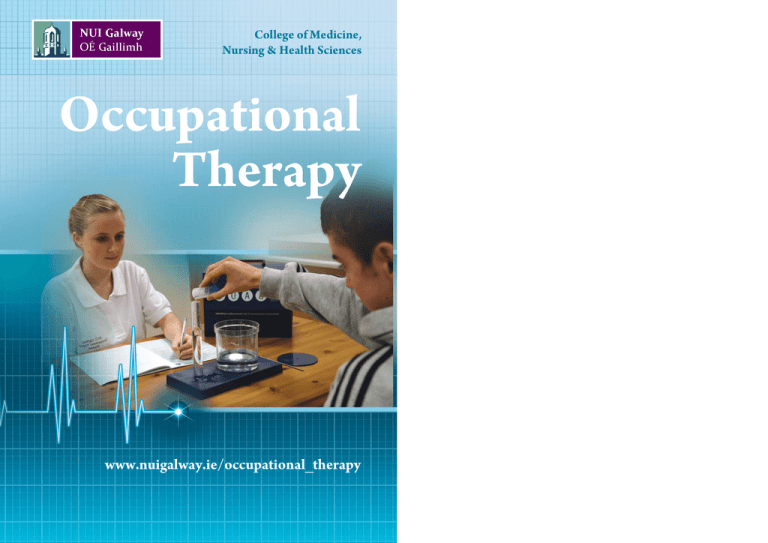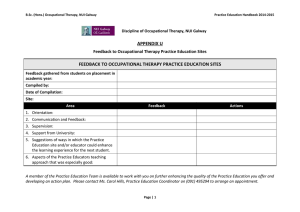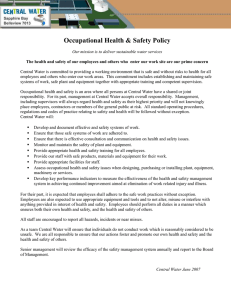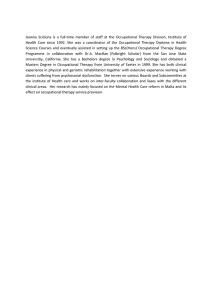Occupational Therapy www.nuigalway.ie/occupational_therapy College of Medicine,
advertisement

College of Medicine, Nursing & Health Sciences Occupational Therapy www.nuigalway.ie/occupational_therapy Studying Occupational Therapy at NUI Galway Occupational Therapy is an interesting and rewarding career. Its primary goal is to enable people to participate in the activities of everyday life. As an occupational therapist you will assist in enabling individuals to do things that enhance their ability to live independently in their daily ‘occupations’. ‘Occupation’ is the term used to describe those tasks and activities with which we fill our daily lives – at the most basic level, washing, dressing, feeding and moving around, to the more complex areas of working, leisure, socialising and managing finances and home. Illness or trauma can result in difficulties in these areas. Occupational Therapists design and deliver intervention programmes to address these difficulties. Study in Occupational Therapy includes a diverse range of subjects including medicine, psychology, sociology and occupational therapy. Occupational Therapy is developing rapidly and as it’s significance in health care grows, so to do the career opportunities afforded to graduates of this dynamic programme. Occupational Therapists work with many different types of people including children with physical and intellectual disability, people with mental health problems, older people recovering from operations like a hip replacement, homeless people and young adults recovering from accidents to name but a few. Course Outline This course explores how difficulties in relation to physical or mental health can affect occupation (i.e. daily activities in relation to areas such as self care, work, leisure, play etc.) in all groups of people - children, adolescents, adults and older adults. In the first year of the programme, students will gain a basic understanding of the human body, psychology and be introduced to the concepts of enabling occupation. These concepts will be further developed in year two of the programme, with an additional focus on neuroanatomy and neurophysiology. Year 1 In years three and four of the programme, students will develop their research skills and evidence based practice. They will learn to analyse, report and present on case studies. In addition to this, year four of the programme prepares future graduates for active engagement in occupational therapy practice, students will review current health care strategies and policies and learn about continuing their professional development once they graduate from the programme. • • • • • • • • Course Facts Year 2 Fundamentals of Occupational Therapy 2 Neuroanatomy Neurophysiology Health Psychology Enabling Occupation - Paediatrics Enabling Occupation- Learning Disability Practice Education 1 and 2 Case Study 1 and 2 Year 3 Bachelor of Science (Occupational Therapy) Work Placement CAO Code: GY502 Entry points (2009): 505 Duration: 4 years Average intake: 25 Entry requirements Minimum Grade HC3 in two subjects and passes in four other subjects at H or O Level in the Leaving Certificate including: Irish, English, another language, Mathematics, a laboratory science subject (i.e. Chemistry, Physics, Biology, Physics with Chemistry (joint) or Agricultural Science and any other subject recognised for entry purposes. Additional requirements • Principles for Practice/Fundamentals 1 • Psychology • Anatomy • Human Body Function • Enabling Occupation - Mental Health • Enabling Occupation - Physical Disability • Groupwork and Professional Skills Students must satisfy the Garda Vetting and Medical Clearance requirements. During the course, students undertake 1,000 hours of Practice Education, which is a clinical practice under the supervision of an experienced Occupational Therapist. At present, this takes place in four 8-week blocks (two in Semester 2 of year two and the other two in Semester 1 of year four). In addition, students have a one-week observation placement at the end of their first year. The aim of Practice Education is to allow you to develop professional competence, to enable you to experience the future work environment and to put the theory you have learned into practice. Students may be asked to undertake placements anywhere in Ireland. • • • • • • • • Fundamentals of Occupational Therapy 3 and 4 Cognitive Neuropsychology Evidence-Based Practice Enabling Occupation - Community Standardised Testing in Occupational Therapy Enabling Occupation - for older Adults Emerging Areas of Practice Research Methods Social Policy Year 4 • • • • • Practice Education 3 and 4 Case Study 3 and 4 Management and Leadership Preparation for Practice Research Project Did you know Occupational Therapy began at NUI Galway in 2003 and has continued to grow and develop ever since . The Association of Occupational Therapists iof Ireland is the professional body working on behalf of all Occupational Therapists and Occupational Therapy students in Ireland. Did you know This course is professionally accredited by the Association of Occupational Therapists of Ireland (AOTI) and the World Federation of Occupational Therapists (WFOT). The qualification is recognised world wide. On successful completion of this course you will be eligible for membership of the AOTI and WFOT. Career Opportunities Aine Gallagher Occupational Therapy graduates will be in a position to work in a variety of settings and with a variety of patients/clients including: • • • • • • • • • Hospitals Community Rehabilitation Services Mental Health Services Child and Adolescent Services Voluntary Organisations Physical and Sensory Disability Services Community Rehabilitation Services Private Practice Primary Care teams Did you know We use a wide range of teaching methods to give you the skills to become an Occupational Therapist including lectures, tutorials, workshops, practical work, service learning, problem solving, individual research and interprofessional learning. Student Profile “I found this course insightful and challenging, providing opportunities to study a range of subjects learn about the complexity of human behaviour and activity and have many diverse job prospects for the future. The course contains a good balance of practical experience and academic learning. The Discipline is small making it easier to get to know people and helps you to feel recognized within the busy University campus life. If you are interested in studying Occupational Therapy, NUI Galway provides a quality course where you will learn and feel part of the community.” School of Health Sciences T +353 91 492 957 F +353 91 495 540 E healththerapies@nuigalway.ie www.nuigalway.ie/occupational_therapy



